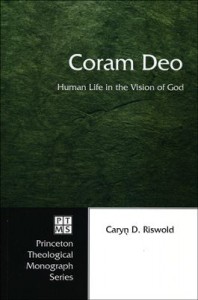 My first book, Coram Deo: Human Life in the Vision of God (Pickwick 2006), is newly available for Kindle starting this week. It originated as my dissertation at the Lutheran School of Theology at Chicago. Here’s an excerpt:
My first book, Coram Deo: Human Life in the Vision of God (Pickwick 2006), is newly available for Kindle starting this week. It originated as my dissertation at the Lutheran School of Theology at Chicago. Here’s an excerpt:
A commitment to feminist theological criticism grounds what I identify to be the problem of atonement as it presumes and presents and understanding of the relationship between God and the human being, and establishes a basis for a theology of the eucharist. The problem lies squarely within theories of atonement:
“We must do away with the atonement, this idea of a blood sin upon the whole human race which can be washed away only by the blood of the lamb.” (Brown & Parker, 1989).
The problem identified in this critical statement is the connection of the suffering and death of Jesus with the redemption of the human race, and the way in which atonement theory lifts up these events as definitive for the relationship between God and the human being, while the sacrament of the eucharist celebrates these events as salvific. This is a result of the prevalence of sacrificial atonement theory for western Christian theology. The problem is connected to the contention that suffering is at least tacitly sanctioned when it is theologically held to be the avenue toward right-relationship with God, if not encouraged as model behavior. Therefore, suffering can become an acceptable, even glorious fact in human life. […]
Theology needs a new understanding of theological anthropology that effectively intertwines traditional resources and contemporary constructions in order to solve the problem identified with atonement theories and sacramental theology. The solutions that I will propose here depend upon a renewed concept of theological anthropology, as the relationship between God and the human being, which will present two mutually participating, enhancing partners, each with an ability to make a difference in the life of the other. This enables a re-examination of the life and death of Jesus in a way which fosters a new understanding of the eucharist as an embodied commitment to struggle, a willingness to risk for justice, and a desire to fulfill the vision of God as truth, beauty, and goodness.
Curious to read more? Click here to get it for your Kindle now.












